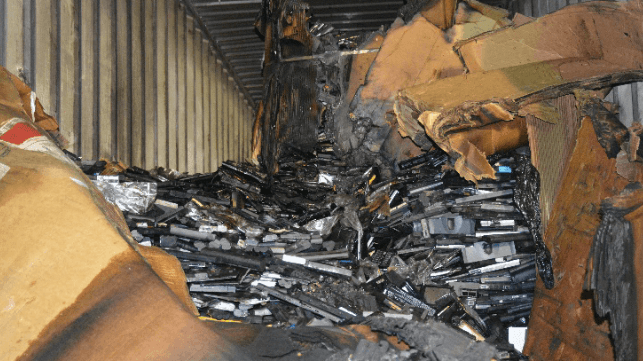USCG Highlights Risks of Shipping Scrapped Li-Ion Batteries

Lithium-ion batteries come with known fire risks, even when new out of the box, and a new U.S. Coast Guard safety bulletin notes that they still have this risk at end of life - after they are taken out of service.
On August 19, 2021, a container loaded with discarded lithium batteries caught fire while enroute to the Port of Virginia. It was due to be loaded onto a foreign-flagged boxship for transport to China. Luckily for the shipowner, the batteries ignited while the container was still moving down the highway, before it reached the quay. Local first responders found that the battery fire was so intense that it had burned a hole through the steel container.
The box was misdeclared as "computer parts" on the bill of lading, and was not labeled as a consignment of hazardous goods. This made the fire more challenging for first responders, according to the Coast Guard, and the damage could have been "catastrophic" if the box had been loaded onto the ship before it caught fire.
Further investigation by the U.S. Department of Transportation determined that the consignment was indeed mislabeled by the shipper, and that the fire was caused by a residual battery charge and a thermal increase.

that matters most
Get the latest maritime news delivered to your inbox daily.
"Field personnel should be on alert for these shipments and engage port stakeholders as appropriate to ensure compliance with all applicable standards and safe shipping conditions," the Coast Guard advised its marine inspectors.
The IMDG Code contains required markings for damaged, defective or scrap batteries, along with specific packaging for safe shipment. Battery short-circuits can lead to thermal runaway, resulting in a dangerous release of flammable and toxic gas, followed by the possibility of a fire or explosion.
